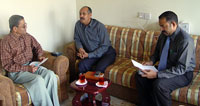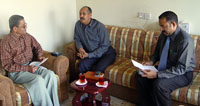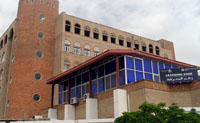
Prof. Dr. Dawood Al-Hidabi to Yemen TimesUST: A glorious leap into the future [Archives:2006/951/Education]
June 1 2006
 |
 |
With a view to profiling such an individual, who is an institution by himself, Dr. Ramakanta Sahu and Dr. Mahmood Akhter met Dr. Dawood.
Excerpts:
YT: Dr. Dawood, It's extremely heartening for us to see that UST is growing from strength to strength under your dynamic stewardship. New disciplines are being added to the existing ones to give the student- community an opportunity to brace themselves in the emerging fields of global academic scenario. Could you spell out some of the new streams that have been added in the recent past?
Dr. Dawood: First of all thanks for coming to the UST. We have a wide range of programs. Our endeavor is to mount such streams that are not there in Yemen or in this region. Recently we introduced programs where the medium of instruction is English. Several programs are provided in the International College, in which we offer instruction in a number of different disciplines. We have three programs to promote students' proficiency in English, then six other programs: four at the UG level and two at the PG level. At UG level we have Bachelor's honors in
1) Business Administration
2) Information Technology
3) Graphic Design and Digital Media
4) Interior Architecture
At PG level we have Masters in
1. Business Administration (MBA)
2. Information Technology (MIT)
All these programs are a joint venture with Malaysian universities. The degrees are awarded by the Malaysian universities and instruction is imparted here with mostly Malaysian teachers and some well-qualified Yemeni teachers.
YT: What is the main thrust of the International College and such other new ventures?
Dr. Dawood: Most of our programs address themselves to the market needs. I would label our university as a 'market driven' university. We found that many of our students study in the secondary schools through English medium. So if our programs are offered through English, the students can consolidate their command of English besides acquiring content knowledge. In fact, most of our clientele are aware of the fact that if they study the programs through English, then they can more competently and confidently cater to the market needs, especially in streams like Business Management or Engineering, where they can potentially secure well-paid jobs and a better future. So in the ultimate analysis, it is the market needs that our programs are oriented towards.
YT: This University is distinctive for its accent on Quality Assurance in respect of the academic programs. How do you assess the effectiveness and efficiency of the Programs and how does the feedback help modify the future academic agenda?
Dr. Dawood: Well, the main aim of Quality Assurance is two fold: diagnose and evaluate the current implementation of the academic programs, and at the same time take steps to improve it on the basis of the feedback. During the last six years we have developed our own model of Quality Assurance in the light of the global trends. We have our own performance indicators whether on the management or on the academic side. At the same time we have designed tools for measuring these performance indicators. Through this mechanism, we have been able to identify our strengths and shortcomings. We have maximized our strengths and have taken steps to plug the lacunae, bridge the gap and fulfill the remedial requirements pertaining to academic and management aspects.
YT: One of the landmarks of this university is that it houses on its campus Learning Zone, the British Council-UST Joint Resource Center, which is a rich academic resource. Is it a collaborative enterprise? What are the present scope of its operation and future directions of expansion?
Dr. Dawood: The Learning Zone (LZ) seeks to offer educational services to students, teachers and researchers from different educational institutions through the supply of books, references, periodicals, and digital databases in a variety of disciplines and fields of knowledge. It also organizes workshops, seminars and other educational activities in a team spirit type of environment. As envisaged in its mission statement, the objectives of the LZ are a) making educational resources available for students and researchers as well as b) helping LZ's visitors to get the information they need.
As a matter of fact, we have a very fruitful and creative interaction with the British Council. They update the library in terms of books and journals and we provide the infrastructure facilities for running the library in the same line as they had been doing at British Council in the past. Hopefully, this will be the nucleus for a good public library in future, which would be open for everybody. This is not the only project we have in collaboration with the British Council. There is another project in the offing for launching an English Language Teaching Center, in all probability, in September 2006. The third project, which we have just completed, is Post Graduate Diploma in Management for 22 Yemeni key women. Members from several private and other societies participated.
YT: Is there any effort in the direction of training the pre- service and in-service teachers with the help of the British Council? If there is one, it would be a very significant contribution to the educational mainstream in Yemen.
Dr. Dawood: That's part of the agreement. The British Council is committed to helping us in our efforts to improve the commands of English of our pupil-teachers as well as enriching the quality of teaching in our university. Hopefully on the basis of this partnership we would try to mount pre-service and in-service training programs in future.
YT: As you are aware, distance education is catching up parallel with formal, institutionalized education in the current global scenario in order to give a wider segment of the student population access to ever-widening educational programs. Are there any plans to include distance learning in your future academic agenda?
Dr. Dawood: Yes, we are alive to the need and the scope of distance learning programs. As a matter of fact, we are investing a huge amount of money for this purpose because there is great demand for open and distance learning in this country. We are trying to reach out far-flung areas like Al-Jauf, and Socotra where facilities for higher education are currently unavailable. We have eighteen different programs, mostly in the areas of Management Sciences and Social Sciences. These programs are very well received as signaled by encouraging enrollment figures. The fees are very modest, about 400$ per year. The clientele have the benefit of earning a university degree which otherwise would be unachievable for most of them and which, in their perception, would substantially improve the quality of life of the community. Since we realize that they cannot come to the university center, we are reaching out to them in their areas. We have a wide network of centers for distance learning spread over several countries such as Saudi Arabia, Somalia and other Gulf countries to provide a large segment of student community there wider access to education. In fact, in the recent past we have mounted an MBA program in Bahrain with enrollment strength of more than two hundred, which is a joint venture between the Open University of Malaysia (OUM) and us.
YT: It might be of interest for you to know that the Indira Gandhi National Open University ( IGNOU) in India is acclaimed as one of the foremost institutions at the international level offering a spectrum of practical and relevant courses through the distance and open-learning mode in various streams.
Dr. Dawood: Well, we are willing to enter into a meaningful and productive collaboration with any university in the world and work together for achieving a common objective.
YT: Yet another glorious feather in the UST's colored cap is the sprawling hospital complex. If we are not mistaken, there are few universities in the Arab Peninsula, which have such a rare distinction. UST thereby becomes a nucleus not only for radiating the light of knowledge, but is justifiably a pioneer in spreading health awareness in the region. Thus the university fulfills its social accountability as well. What motivated you to set up a hospital of this magnitude?
Dr. Dawood: Success breeds success. When we started the university, we were determined to offer quality human resources. I am glad to say that we are producing better, if not the best, quality of human resources as signaled by the fact that about 40% of our graduates are recruited into the cadres of foreign countries. That's an indicator of the acceptability of our quality human resources on a larger global perspective. Still we are not complacent. We're continually, relentlessly and rigorously trying to improve the quality of human resource that would most certainly trigger national reconstruction.
As far as the hospital sector is concerned, the idea of a sophisticated hospital with the state-of-the-art medical facilities was originally conceived keeping in view two vital considerations. First, it would improve the quality of instruction of our medical school. Second, it would provide cost-effective health services and specialized medical care to the common man. You might know that every year some 120,000 to 150,000 Yemeni nationals are flying abroad for treatment. We thought of doing something about this. UST hospital is geared to fulfill the long-felt need of quality health care to the common man at an affordable cost. We felt amply rewarded and our stand vindicated when His Excellency the President of the country visited our hospital and commended the hospital as a great national institution.
YT: That's indeed a great achievement. Is it, in any sense, a super specialized hospital?
Dr. Dawood: The hospital was commissioned only ten months ago. However, within this short duration, in the first phase, we have been able to provide specialized medical care in some twenty departments. We are planning to increase areas of specialization and sub-specialization in the second and third phases of our expansion network which would, inshallah, be completed in 2 or 3 years.
YT: Do you envisage any subsidized medical care for people who are below the poverty line?
Dr. Dawood: Our hospital is meant to provide health services to everybody from the very poor to the rich people at a very reasonable rate. To give you one example, the MRI costs in our hospital YR 20,000, which in some govt. hospitals costs YR 22,000 while in some private hospitals the same is available for YR 24,000. Similarly, accommodation for in- patients ranges from YR 4000 to YR 25000 per night. This wide range in our fee structure is intended to offer opportunity to everybody for availing themselves of quality and at the same time cost effective health care.
YT: What are the facilities for the university employees in terms of health care?
Dr. Dawood: Well, there is a special scheme called the “health care scheme” covering all employees, academic and management, to get a special discount in the cost of treatment in the same way as discount in the university tuition fees for their children and wards.
YT: Do you also encourage medical research activities? If so what are the current thrusts?
Dr.Dawood: The Medical Research & Development Center of the UST is currently actively engaged in five research areas such as Immunology, Epidemiology, Community medicine, Pharmacology, and Microbiology.
YT: What are the dimensions of the UST hospital's future growth commensurate with its impressive track record in the past?
Dr. Dawood: You know, any kind of institution whether in the education, business, or health sector consists of different facets, which need to be tackled skillfully. In terms of our hospital services, from reception to nursing, medical and paramedical staff management, maintenance and in- patients, we are trying our best to inculcate quality so that each sector can maximize its potential. You see our consultants are recruited to be the best, so also the other medical and administrative staff. We, for the first time in Yemen, have established a well-laid out system where everything is automatic, in keeping with international standards. Our long-term strategic goals are as follows:
– Providing opportunities for specialized training
– Promoting publication of research
– Building stronger partnerships
– Educational excellence
YT: How do you envision the University ten years from now?
Dr. Dawood: Well I visualize UST as one of the best in the world, let alone in the Arab world. In the wake of globalization, we must all work together with a team spirit to confirm to world standards, be it in Education or health services.
YT: Thanks a lot, Dr. Dawood, for sharing your views with us and enlightening us.
Dr. Dawood: Thank you.
——
[archive-e:951-v:14-y:2006-d:2006-06-01-p:education]


